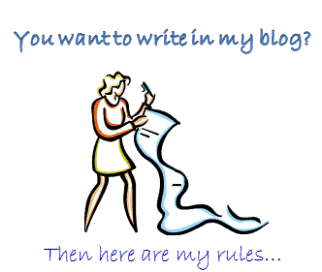Setting rules for guest posts on your blog
As I have just started using guest bloggers on this blog (see Karol’s post from yesterday as an example), it seemed timely to discuss how you establish guidelines for your guest bloggers.
Why have guest blogger guidelines?
Every blog is different – as are all the bloggers – which means two things.
- to keep your blog focussed on your brand and style, you need to define how that happens
- not all bloggers will have the same high standards as you so don’t assume any guest blogger will behave professionally or within your style
Guidelines for guest bloggers helps maintain your blog. Publicly available policies or guidelines will also reduce the number of blog posts you receive that don’t meet your rules.
What goes into guest blogger guidelines?
Well, the short answer is ‘that’s up to you – it’s your blog!’
But I’m guessing you want a more detailed answer so here are some important points to consider – you may or may not list all of them for bloggers to see but it’s good to have considered each one relative to your blog.
- length of posts – minimums and maximums
- unique content vs reused content – including how long after you publish the post can it be used
- standard of writing – is average acceptable or do you want great?
- standard of content – is it correct and up-to-date? Does it give something new or just spout motherhood statements?
- copyright and ownership – be sure the blogger has the right to offer you the post and any accompanying images
- how many links can be included in the post? in the bio box?
- how long is their bio? will it be shown and can it include images?
- do posts have to be informative rather than an ad for someone else?
- can affiliate links be included?
- what type of content do you want (or not want)? For instance, toplists only takes lists and other sites don’t want reviews
- what topics do you want (or not want) covered? Does it have to be something not covered before in your blog?
- will links get a dofollow or nofollow attribute?
- what promotion do you expect from the guest blogger?
- do you expect the guest blogger to visit your site and respond to comments? it’s in their best interests to do so but many don’t
- are there suitability factors such as no adult concepts or no swearing?
- how often will you post something by the same person?
Which ones do you include in your guest blogger policy (even if it is an unwritten policy so far!)?
Did anything on that list make you say “Oh, that’s a good idea!” and get you thinking?
I’ll post more about hosting guest blog posts soon, but let me know if you have specific questions…




Recent Comments